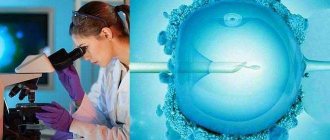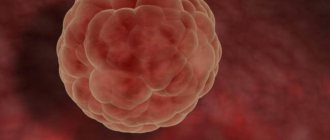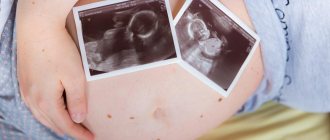Changes in a woman's body
In the first week after conception, pregnancy practically does not manifest itself at all, but changes are already beginning to occur in the body. Over the next 9 months (40 weeks), they will become more and more noticeable: the body will begin to rebuild itself to ensure the embryo’s full and safe development. During pregnancy, the so-called functional systems “mother-fetus” and “mother-placenta-fetus” are formed [1], the ultimate goal of which is the birth of a healthy child. This mechanism is unique and has no analogues: it is not the embryo that adapts to the characteristics of the mother’s body, but the body that creates within itself an optimal environment for the development of the fetus. Even before conception, the processes occurring in a woman’s body during the menstrual cycle are aimed at preparing suitable conditions for fertilization of the egg. During a certain phase of the cycle, called ovulation, it is easiest to get pregnant: the cell is mature, all conditions are met.
Menstruation.
A woman's menstrual cycle is divided into several periods:
- menstruation, during which the endometrium lining the walls of the uterus separates and comes out along with the unfertilized egg. This happens if pregnancy did not occur during the previous cycle. With menstruation, the follicular phase of the ovaries begins. A dominant follicle is determined and developed, which will later give birth to a mature egg;
- The ovulatory phase begins approximately on the seventh day of the cycle and lasts about three days. During this time, the follicle reaches maturity and at the end of the phase ruptures, releasing an egg ready for fertilization;
- Ovulation is the process during which an egg is released from the follicle and descends from the ovary into the fallopian tube. This takes about an hour, the cell retains the ability to be fertilized for about another day;
- The luteal phase, which makes up the second half of the cycle, proceeds differently depending on whether fertilization has occurred or not. Either implantation of a fertilized egg occurs, or gradual death of the endometrium.
Conception.
Ovulation lasts a short time, and the egg’s ability to fertilize only lasts about a day or two. It is impossible to track this process on your own: some women talk about characteristic symptoms and even pain, but this is a very individual and unreliable indicator. Sometimes characteristic discharge (cervical mucus) and an increase in basal temperature can serve as a marker, but all these signs have an error and are not able to give accurate results. However, pregnancy can also occur if sexual intercourse occurs several days before ovulation: healthy sperm, entering the uterine cavity, remain viable for 3-4 days.
Diet and vitamin intake
In the initial stages of pregnancy, especially in the first weeks after conception, very important changes occur in the structure of the embryo. All organs and systems are formed, all tissues begin to form. Even the slightest negative factor at such early stages of pregnancy can lead to miscarriage. Therefore, proper nutrition of the expectant mother is one of the components of a successful pregnancy and the health of the unborn child.
You need to eat well, starting from the moment you plan to conceive. After pregnancy, it is important to carefully monitor your diet. Firstly, the menu must be compiled in such a way that a woman can get the required amount of fats, proteins and carbohydrates from it daily. The diet should be enriched with foods such as fresh vegetables and fruits, herbs, nuts and berries. Alcoholic drinks should be completely avoided. It is forbidden to eat foods with preservatives, dyes, and flavor enhancers. In general, any chemical additives can be harmful.
Secondly, you need to consult a doctor. It is possible that he will prescribe some vitamins. It is very important that the fetal body does not experience folic acid deficiency. This will minimize the risk of birth defects of the nervous system. You can take folic acid as an independent drug, or you can get it from multivitamin complexes.
As a rule, gynecologists advise starting to take vitamins 3 months before the expected pregnancy. This will provide the baby with all the necessary substances and give birth safely.
It is important!
- The sperm is able to reach the egg pushed into the fallopian tube in about 2 hours, after which fusion occurs.
- One sperm, the first to penetrate the membrane, merges with the egg, after which it becomes impenetrable to others. A zygote is formed - a cell from which the embryo will begin to develop.
Implantation of fertilized egg.
Over the next few days, under the influence of muscle contractions and cilia of the mucous membrane, the fertilized egg moves towards the exit of the fallopian tube, that is, to the uterus. Around the same period, the process of fragmentation begins: the cells of the zygote begin to divide, but its overall size does not increase, each subsequent cell becomes smaller than the previous one. Having descended into the uterus, the zygote reaches the blastocyst stage in a few days, after which it gets rid of the membrane and is implanted inside the endometrium - the lining of the uterine walls. Under the influence of the hormone progesterone, aimed at maintaining pregnancy, the endometrium becomes thicker and surrounds the fertilized egg on all sides. Implantation allows you to protect the embryo and additionally nourish it with the secretion produced by the endometrial glands. Several days usually pass from conception to implantation, and the countdown of the first embryonic week does not begin with it, but with the formation of the zygote.
Main dangers and recommendations on how to avoid them
For the full development of the fetus, it is necessary to create appropriate conditions. If a woman feels that she is pregnant, but her period begins, it is necessary to exclude all possible complications:
- You need to do the test at home.
- If two lines appear on the test, you should urgently contact a gynecologist.
- To confirm pregnancy, you need to perform laboratory blood and urine tests, as well as an ultrasound.
- If necessary, a woman is placed in a hospital under the supervision of medical personnel, where she receives the necessary medical support aimed at preserving and proper development of the fetus in the uterus.
In any case, a woman must remember that she is responsible for two lives and negligence or frivolity in such a situation is unacceptable.
Preparing for conception
To make your pregnancy successful, it is better to prepare for it. Couples planning a child adjust their lifestyle in such a way that the processes in the body that promote conception proceed without interruption, and the likelihood of pregnancy increases.
Visit to the gynecologist.
A woman who is planning to conceive a child should be regularly monitored by a doctor. The specialist will conduct an examination, tell you if there are any problems in the body that should be eliminated before conception, and give recommendations for adjusting your lifestyle. If problems are observed, the doctor will identify their cause and prescribe treatment. However, the gynecologist is not the only specialist who needs to be visited during this period. It is advisable to check your health in several areas: pregnancy is a serious burden on the body. To mitigate its manifestations, it is advisable to eliminate in advance factors that may interfere or harm. A man should also be examined: the quality of sperm is no less important for successful conception than the condition of a woman’s body.
It is important!
- You should see a gynecologist regularly in order, firstly, to detect pregnancy in time, and secondly, to track and eliminate the slightest irregularities.
- You can ask your gynecologist what other doctors you should visit. Endocrine disorders, metabolic problems, excess or underweight can affect conception.
Taking vitamins.
If your body doesn't have enough nutrients, your chances of getting pregnant may decrease. In the case of severe vitamin deficiency or lack of weight, menstruation, and with it ovulation, simply does not occur, that is, fertilization is impossible.
Risk factors for miscarriage: what to look for at 5 weeks
The 5th obstetric week of pregnancy is an anxious time for many expectant mothers, especially those who were planning a pregnancy. Miscarriage is common in early pregnancy, especially if the woman is at risk or has experienced severe stress or trauma. Risk factors for a non-developing pregnancy or miscarriage usually include: endocrine or genetic disorders, age over 35 years, gynecological diseases, unhealthy lifestyle, the presence of sexually transmitted infections, two or more miscarriages in the past. If there is reason for concern (for example, pain in the lower abdomen during pregnancy, there is bloody vaginal discharge, fever
) - immediately consult a doctor for all necessary examinations and hospitalization!
Weight gain at 5 weeks of pregnancy ranges from 0.5 kg (with a BMI of more than 26) to 1.1 kg (with a BMI of less than 19.8). To calculate your individual weight gain at 5 weeks, use the pregnancy weight gain calculator.
It is important!
- There are ready-made vitamin courses designed to increase the likelihood of conception. If no serious abnormalities requiring observation by a doctor are identified, you can use them.
- This point also applies to men: the state of the body directly affects the motility and viability of sperm, as a result of which they may lose the opportunity to reach the egg.
- If your doctor does not recommend vitamins in a particular case, it is better to listen to his words. It is also worth choosing supplements after consultation with a specialist.
Nutrition.
Problems leading to failure to conceive are often caused by insufficient or unhealthy nutrition. For pregnancy to occur, an optimal weight is necessary: a lack of it leads to inhibition of reproductive processes, while an excess is harmful to the normal production of sex hormones.
It is important!
- Excessive amounts of sweets and fast carbohydrates (flour, snacks, fast food) have a bad effect on fertility, as they seriously affect the level of insulin and blood sugar, which leads to an imbalance of hormones necessary for ovulation.
- Proteins are needed for normal sperm viability and motility, so it is important for a man to monitor their number. The female body must also receive enough proteins: this is a building material for the body.
- It is important to control the amount of fat. A deficiency leads to problems with ovulation, while an excess affects hormonal levels. It is worth observing the golden mean.
- It is better for both men and women to avoid foods containing large amounts of chemical additives, as well as alcohol.
Physical exercise.
Physical inactivity harms all systems of the body, including reproductive. Moderate physical activity is indicated to improve metabolism, which in turn increases the likelihood of conception. Of course, excessive fanaticism, as in the case of nutrition, is inappropriate: excessive overload will only harm the body and reduce the likelihood of getting pregnant. It is necessary to maintain a level of physical activity that does not cause serious stress to the body. This will allow:
- keep the body in good shape;
- normalize metabolism;
- strengthen muscles, which is especially important for successful pregnancy;
- improve sleep;
- increase libido.
The effect of physical activity on emotional well-being is also important. Stress reduces your chance of getting pregnant, and moderate activity is a good way to relieve it. It is recommended for both parents to reconsider their lifestyle: both the female and male reproductive systems will benefit from healthy exercise. If the couple has already practiced sports or fitness, they can continue, but avoiding overload.
Signs and symptoms of pregnancy
If you are pregnant for the first time, then you may well not notice these first signs of pregnancy or confuse them with symptoms of your impending menstruation.
You shouldn’t spend long hours searching for answers on forums in worry; in any case, your research will not change what has already happened or has not happened, but it can seriously spoil your mood and sleep.
| Minor pain in the lower abdomen and spotting | 1-4 week |
| Lack of menstruation | 4 week |
| Fatigue | 4-5 week |
| Nausea | 4-6 week |
| Breast swelling | 4-6 week |
| Frequent urination | 4-6 week |
| Constipation | 4-6 week |
| Dizziness when moving | 5-6 week |
| Mood swings | week 6 |
| Temperature changes | week 6 |
| High blood pressure | 8 week |
Pain and slight bleeding
From 1 to 4 weeks, changes in a woman’s body occur at the cellular level. The fertilized egg creates a group of cells filled with fluid called a blastocyst, which will later develop into organs and body parts of the fetus.
Approximately 10-14 days after conception (week 4), the blastocyst attaches to the endometrium lining the uterine wall. This process may cause slight bleeding, which can be confused with a light period.
Here are some signs of such bleeding:
- color may be red, pink or brown
- bleeding: usually comparable to normal menstruation, usually lighter
- painful sensations
- usually lasts about three days
Lack of menstruation
After the blastocyst attaches to the walls of the uterus, the body begins to produce a hormone called human chorionic gonadotropin, which tells the body that it is time to stop releasing eggs from the ovaries each month. Most often, after conception, periods disappear at 4 weeks of pregnancy.
If you're late, it's worth taking a home pregnancy test, especially if you have irregular menstrual cycles.
Fatigue
Fatigue can occur at any time during pregnancy. During pregnancy, progesterone levels rise, and this hormone can make you feel sleepy. If you feel tired, make sure you get enough sleep.
Morning sickness and vomiting
Nausea and morning vomiting usually develop between 4 and 6 weeks of pregnancy. In fact, such symptoms can occur not only in the morning, but at any time of the day. This symptom is typical for the first 12 weeks of pregnancy. If you feel nauseous frequently, make sure you drink enough water to avoid dehydration.
Breast swelling and tenderness
Breast changes can begin between 4 and 6 weeks of pregnancy. They are also associated with changes in hormone levels. Most often, the breasts swell somewhat and become more sensitive than usual. Usually these symptoms disappear later, when the body gets used to the changed hormonal levels.
Frequent urination
During pregnancy, blood flow increases and this causes the kidneys to process more fluid than usual, which can cause frequent urination even in the early stages of pregnancy.
Constipation and bloating
This symptom is similar to a typical menstrual symptom and is also caused by hormonal changes that can cause digestive processes to slow down, causing bloating and constipation.
High blood pressure and dizziness during pregnancy
Most often, in early pregnancy, women's blood pressure drops, which can cause a feeling of dizziness due to the dilation of blood vessels in the brain. High blood pressure in the first 20 weeks of pregnancy usually means that there are some health problems that occur along with pregnancy. Such a symptom could be present unnoticed before pregnancy, but it could also develop during the process. In such cases, it is especially important to monitor your blood pressure and consult a doctor.
Mood swings
Because estrogen and progesterone levels are elevated during pregnancy, this can cause changes in your emotional background and you may become more sensitive than usual. They can cause strong feelings such as depression, irritability, euphoria and anxiety.
First signs of pregnancy
In the first week of pregnancy, as a rule, there are no sensations at all: there is no stomach yet, nothing hurts, movements begin when the fetus has already reached a respectable size. Women planning to conceive tend to be anxious about their well-being, so they may attribute the slightest changes to pregnancy. In fact, the main signs appear from about the fifth obstetric week. These include:
- nausea in the morning;
- chest pain;
- delays and absence of menstruation;
- changes in figure (hormonal changes affect weight gain);
- changes in the genitals (swelling, color change, etc.).
The first month is considered the so-called critical period [2], during which the slightest influence can lead to a miscarriage, and the woman will not even know that she was pregnant. Therefore, the best thing that can be done in the early stages is not to be nervous and wait for signs to appear that will confirm or refute the assumptions that have appeared.
Feelings in the first week of pregnancy
In our pregnancy calendar, you, along with thousands of other expectant mothers, will go through an amazing and lifelong journey of forty obstetric weeks. This will be a happy and prosperous journey, starting from the first day of the last menstruation and ending with the long-awaited and most joyful birth of the baby.
Let’s immediately make a reservation that obstetric weeks are usually counted from the first day of the last menstruation, and the embryonic weeks of “interesting position” take their starting point from fertilization. In our calendar, in accordance with advanced medical science, we count obstetric weeks.
From our calendar you will learn what happens in your body in the 1st week of pregnancy and at each new stage, how the fetus develops and grows, you will receive useful recommendations, you will see encouraging videos, expectant mothers will share photos of their bellies, ultrasound images, their impressions and symptoms . There will be a ton of useful information, we guarantee.
The first obstetric week of pregnancy, as you already understand, precedes conception, so the woman should not have any unusual sensations.
There can be no signs of pregnancy at 1 week according to the obstetric counting method. They will appear 14 days later.
Stay up to date with all the changes every week of pregnancy
Receive letters about the baby's development and the mother's condition once a week.
Methods for determining pregnancy
Methods to detect pregnancy at an early stage include tests, tests and ultrasound. The choice of method depends on the period: some are indicative only at certain stages.
Ultrasound.
Usually carried out after a visit to the gynecologist, if pregnancy is confirmed. It gives accurate results, is informative and is used as one of the main diagnostic methods. The study is routinely carried out several times to track the development of the fetus: for example, at 6 weeks during an ultrasound, you can hear the baby’s heartbeat [3]. For the first time, a gynecologist will refer you for this procedure only if other factors suggest pregnancy. With an ultrasound examination, you can detect the fertilized egg, assess its size and condition, and understand whether any malfunctions occurred during conception. It is not recommended to use ultrasound as an independent method; the procedure is carried out in combination with other methods to obtain a complete picture of what is happening. Before carrying out it is necessary to contact a gynecologist.
Pregnancy test.
Many manufacturers offer affordable and easy-to-use tests that supposedly allow you to track pregnancy in the first days after conception. In fact, this is almost impossible before implantation of the fertilized egg: such tools become informative at least a week after conception. It is then that hCG, a pregnancy marker hormone, appears in the blood and urine. Before using the test you must:
- make sure the expiration date is current;
- follow the recommendations specified in the instructions.
Answers to questions about 1 week of pregnancy
- What can a woman feel in the first week after conception?
During the first week of pregnancy, the embryo moves through the fallopian tube, reaches the uterus and implants into the endometrium. At this time, hormonal changes manifest themselves in the woman’s body. It is thanks to this restructuring that she can bear fruit. Therefore, malaise, general weakness, and nausea may occur, especially in the morning. Sometimes dizziness and cravings for unusual foods occur. In some cases, women note an increased urge to urinate, which is explained by increased blood flow in the pelvis. When, even before the moment of conception, a woman suffered from diseases of the gastrointestinal tract, it is possible that after pregnancy, constipation will occur and gas formation will increase. The fact is that hormones produced by the body affect the intestines, reducing its contractility. The pain that appears in the lower abdomen is explained by spasms of the smooth muscles of the uterus.
- After a positive pregnancy test, I immediately went to the gynecologist, and the doctor diagnosed me as 4 weeks pregnant. An ultrasound showed the gestation period was 1-2 weeks. How is this possible?
The gynecologist calculated the onset of pregnancy from the date of the last menstruation. If the test was carried out in the first days of the delay, then the countdown began from that moment. Actual pregnancy begins from the moment the egg is fertilized. This happens on days 14-18 of the cycle. The ultrasound showed the embryonic stage of pregnancy, that is, starting from the moment of conception.
- We are planning a pregnancy. There is no delay, but I feel weakness, slight nausea, my stomach hurts, like before menstruation. Could these be early signs of pregnancy?
Such signs may indicate the onset of pregnancy. However, they can also accompany other conditions of the body, so you should do a pregnancy test. It is advisable to choose a test that has increased sensitivity to hCG.
- I think I'm 1 week pregnant, but I got sick with ARVI. Is this dangerous for the child?
Any viral infections, especially those accompanied by fever, can lead to fetal developmental abnormalities. Sometimes doctors in such a situation recommend terminating an early pregnancy using a gentle method. Although very often serious illnesses provoke spontaneous abortions without any outside intervention. If the disease is mild, then you should wait until the body copes with it on its own. In this case, there is no reason to worry. However, it is necessary to consult a doctor.
Author of the article:
Lapikova Valentina Vladimirovna | Gynecologist, reproductive specialist
Education: Diploma in Obstetrics and Gynecology received from the Russian State Medical University of the Federal Agency for Health and Social Development (2010). In 2013, she completed her postgraduate studies at NIMU named after. N.I. Pirogova.
Our authors
It is important!
The method should be applied in the morning: this increases its reliability.
If there are gynecological diseases or errors in the procedure, it can give false results, and this must be remembered. If you have any doubts, it is recommended to consult a doctor. Blood for hCG.
Among all the analyses, this one is considered reliable and at the same time accessible. The hormone hCG (human chorionic gonadotropin) begins to be produced by the female body immediately after conception, but its level becomes noticeable about a week after implantation of the fertilized egg. Its concentration in the blood is higher than in the urine, which increases the information content of the analysis. As a rule, a gynecologist sends a patient for testing if there is a possibility that she is pregnant. The analysis can be carried out independently with the help of specialized medical centers, but it is recommended to do this under the supervision of a doctor - he will be able to analyze the results and give the patient a detailed answer about her condition. Diagnosis should be made no earlier than a week after the expected conception.
What's happening
The 1st week of pregnancy is actually not pregnancy yet. The female body is just preparing for the release of the egg. Every month, your central nervous system adjusts your hormonal levels to prepare one (or, in rare cases, several) of your 300,000 female cells for fertilization. On average, the process takes about two weeks. If a mature egg meets a sperm and fertilization occurs, a new life will be born. And now you have another menstrual bleeding. This is how the uterine cavity is cleared of the “old” endometrium and at the same time begins to be lined with a new layer, which can be useful for the future embryo.
Let's sum it up
Pregnancy is a complex and multi-level process, during which a whole new organism is formed from one cell. The early stages, despite the absence of symptoms, are especially important: even before conception, you should pay attention to your lifestyle, adjust your diet and see a doctor. Even if there are no signs in the first week, the processes occur rapidly, so the optimal solution for a woman expecting pregnancy is not to be nervous, monitor her condition and wait. Calmness and well-being of the mother are the most important conditions for the healthy and full development of the embryo, so take care of yourself, avoid stress and follow the doctor’s recommendations. After some time, tests and studies will help you understand whether pregnancy has actually occurred.
Useful tips and recommendations for the expectant mother
The birth of a new life is coming inside a woman, and measures taken to preserve her health during this period are more important than ever. Therefore, at this time it is important to find out what is not allowed in the first week of pregnancy. If you haven't done this before, start right now, and this will definitely have a beneficial effect on your baby's development in the future.
- Probably the most important warning is to avoid all possible ingestion of poison into a woman’s body. That is, smoking and alcohol in the first weeks of pregnancy should be completely avoided.
- All medications that a woman is forced to use for one reason or another must be approved by a doctor. Everyone knows that many medications can cause irreversible processes in a woman’s body. Therefore, it is unacceptable to take medications without a doctor's permission.
- Try to avoid X-ray exposure of the abdominal organs. Such research is carried out only when absolutely necessary!
- Stressful situations negatively affect the health of the expectant mother, so it is advisable to solve all problems that arise peacefully. Don't quarrel with your loved ones, don't conflict with your employees! It would be much better to create a cozy romantic atmosphere at home with your husband, because sex in the first weeks of pregnancy will not only allow you to relax, but will also strengthen your relationship with your spouse in the intimate sphere.
- Avoid contact with sick people as much as possible. It is important to dress warmly during the cold season and protect yourself from colds and various diseases that can cause an increase in temperature, which is extremely undesirable in the first weeks of pregnancy. The notorious garlic and onions come to the rescue here - the best means of preventing colds in the first weeks of pregnancy.
- To strengthen the immune system and enrich the body with missing microelements, it is recommended to take vitamins already in the first weeks of pregnancy. But don’t forget about proper nutrition, which is so important. The diet must include vegetables, fruits, grains and dairy products. It is especially important to pay attention to the folic acid content in foods, which will help prevent birth defects and promote normal fetal development.











